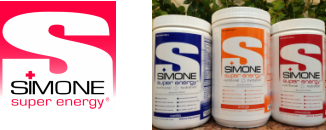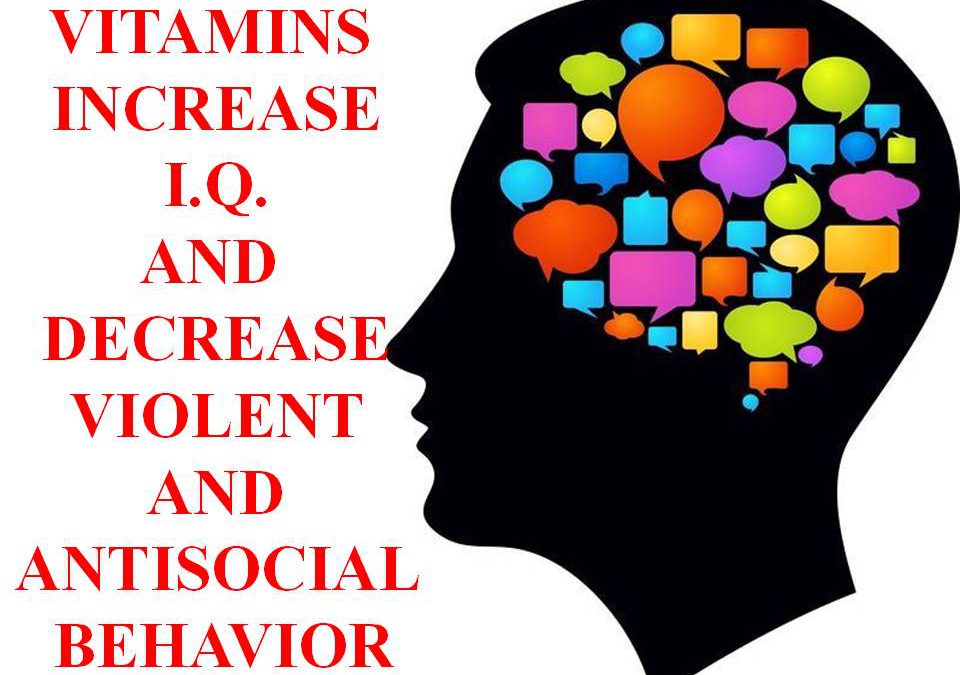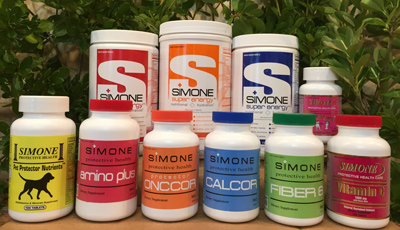We do not diagnose disease or recommend a dietary supplement for the treatment of disease. You should share this information with your physician who can determine what nutrition, disease and injury treatment regimen is best for you. You can search this site or the web for topics of interest that I may have written (use Dr Simone and topic).
“We provide truthful information without emotion or influence from the medical establishment, pharmaceutical industry, national organizations, special interest groups or government agencies.” Charles B Simone, M.MS., M.D.
VITAMINS INCREASE I.Q. AND DECREASE VIOLENT AND ANTI-SOCIAL BEHAVIOR
https://bit.ly/2nupVG0
With kind permission from Cancer and Nutrition (Charles B. Simone, M.MS., M.D.)
Lawrenceville, NJ (Dr Charles B Simone) – The human brain consumes about 20% of all the calories taken each day. The brain does not function well if there are few calories in the diet and if the diet lacks proper vitamin/mineral intake. Studies involving hundreds of thousands of children from the United States and around the world show this could lead to poor brain functioning, low I.Q., poor impulse control and bullying. High fat foods, junk food, and lack of vitamins, minerals, fruits and vegetables lead to a higher risk.
INCREASE I.Q.
803 New York City Public Schools increased fruits and vegetables and decreased fats and sugars according to World Health Organization recommendations. The academic performance rose by 16% for 1.1 million students, and the number of learning disabled children fell from 125,000 to 74,000 in one year. In another study, 51,000 learning disabled children who ate according to these dietary revisions were no longer two or more grades behind in performance.
More than 1,750 children and young adults were studied in Arizona, California, Oklahoma, Missouri, Belgium, England, Scotland and Wales. The I.Q. increased for those who were given the vitamin-mineral supplements. And, the I.Q. rose by 16 points for the children who were initially undernourished.
The academic performance for more than 300 children between the ages of 6 and 14 was studied in Arizona and California. The children who took vitamin/mineral oral supplementation for three months had significantly higher gains in grade level and also improved academically at twice the rate compared to those who did not take the supplements.
DECREASE VIOLENT AND ANTISOCIAL BEHAVIOR
Nine juvenile correctional facilities in Alabama, California, and Virginia increased fruits and vegetables and decreased fats and sugars according to World Health Organization recommendations. There were 48% less violent and nonviolent antisocial behavior among 8,047 juveniles in the correctional facilities. All of these changes were thought to be related to higher amounts of vitamins and minerals in the new diets. Children who didn’t eat breakfast and children who were hungry at night also had a higher risk for becoming a bully or being a victim of bullying.
Dietary intake of 13 vitamins and 11 minerals was measured for 165 adult prisoners and 257 confined juvenile delinquents. Those who consumed the higher amounts of nutrients were less violent and antisocial behavior fell by 40%. In addition, randomized trials also confirm that people who were given vitamins and minerals were less violent and exhibited less non-violent antisocial behavior.
Of course there are many other risk factors linked to bullying like parent-child relationships, neighborhood safety, etc. But we can control diet and vitamin intake.
MOST COMMON NUTRIENTS THAT AFFECT I.Q. and ACADEMIC PERFORMANCE
Vitamins in order: Pyridoxine, Folic Acid, Thiamin, Niacin, Vitamin C, Pantothenic Acid.
Minerals: Iron, Magnesium
MOST COMMON NUTRIENTS THAT AFFECT BEHAVIOR
Minerals in order: Iron, Calcium, Copper, Magnesium,Zinc, Selenium, Manganese, Chromium, Molybdenum.
Vitamins: Vitamins A and E, Riboflavin, and B12.
What can a parent do if their child performs academically poorly in school and/or behaves badly? Have your physician order a blood test for vitamins and minerals and if any are below the normal range, then nutrient supplementation may correct your child’s academic performance and/or behavior.
Although the United States is a wealthy nation, many of our children are at risk of eating a poor diet – high fat, high sodium, low fiber, and low intake of vitamins and minerals. Even if you eat a “normal healthy” diet, you still may be at risk for marginal deficiencies of nutrients. So take a vitamin/mineral supplement.
https://www.simonesuperenergy.com/marginal-vitamin-deficiencies-excerpt-from-cancer-and-nutrition-1980-revised-2007-c-b-simone-md/
© 2019 Charles B. Simone, M.MS., M.D.
References
-
Schoenthaler SJ, Bier ID. Vitamin-mineral intake and intelligence: A macrolevel analysis of randomized controlled trials. J Alternative Complementary Med: Research on Paradigm, Practice, Policy. 1999; 5:125-134.
-
Schoenthaler SJ, Bier ID. The effect of vitamin-mineral supplementation on the intelligence of American school children in grades one to six: A randomized double-blind placebo-controlled trial. J Alternative Complementary Med: Research on Paradigm, Practice, Policy. 1999; 6:19-30.
-
Eysenck HJ Schoenthaler SJ. Raising IQ level by vitamin mineral supplementation. In: Sternberg R, Grigorenko E, eds. Intelligence, Heredity and Environment.Cambridge, UK. Cambridge Univ Press. 1997; 363-392.
-
Schoenthaler SJ, Bier ID. The impact of enhancing nutrition using vitamin-mineral tablets on academic performance among school children: A randomized double-blind placebo-controlled trial. Paper submitted
-
Schoenthaler SJ, Doraz WE, Wakefield. The impact of a low food additive and sucrose diet on academic performance in 803 New York City public schools. Intl J Biosocial Res. 1986; 8:185-195.
-
Schoenthaler SJ, Amos SP, Doraz WE, et al. Controlled trial of vitamin mineral supplementation on intelligence and brain function. Personality Individual Differences. 1991; 112:343-350.
-
Benton and Roberts. Effect of vitamin and mineral supplementation on intelligence of a sample of school children. Lancet. 1988; Jan.:140-144.
-
Campbell, et al. Vitamins, minerals, and I.Q. Lancet. 1988; Sept:744-745.
-
Letter to the Editor. Vitamin/mineral supplementation and non-verbal intelligence. Lancet. 1988; Feb:407-409.
-
Grantham-McGregor SM, et al. Nutritional supplementation, psychosocial stimulation, and mental development of stunted children: The Jamaican study. Lancet. 1991; 338:1-5.
-
Brown, et al. J Pediatrics. 1972; 81:714.
-
Webb and Oski. Iron deficiency and IQ. J Pediatr. 1973; 82:827-30.
-
Benton, et al. Glucose improves attention and reaction. Biol Psychol. 1972; 24:95-100.
-
Benton. Influence of vitamin C on psychological testing. Psychopharmacology. 1982; 75:98-99.
-
Pfeiffer C, Braverman E. Zinc, the brain and behavior. Biol Psychiat.1982; 17:513-31.
-
Godfrey P, et al. Enhancement of recovery from psychiatric illness by methylfolate. Lancet. 1990; 336:392-394.
-
Schoenthaler SJ, Bier ID. The effect of vitamin-mineral supplementation on juvenile delinquency among American school children: A randomized double-blind placebo-controlled trial. J Alternative Complementary Med: Research on Paradigm, Practice, Policy. 2000; 6:7-18.
-
Schoenthaler SJ, Amos SP, Hudes. A randomized trial of the effect of vitamin mineral supplementation on serious institutional rule violations. Submitted 2001.
-
Schoenthaler SJ, Bier ID. The effect of randomized vitamin-mineral supplementation on violent and non-violent antisocial behavior among incarcerated juveniles. J Nutr Environmental Med. 1997; 7:343-352.
-
Schoenthaler SJ. Diet and crime: An empirical examinatin of the value of nutrition in the control and treatment of incarcerated juvenile offenders. Intl J Biosocial Res. 1983; 1:25-39.
-
Schoenthaler SJ. Diet and delinquency: A multi state replication. Intl J Biosocial Res. 1983; 5:70-78.
-
Schoenthaler SJ. Diet and delinquency: Empirical testing of seven theories. Intl J Biosocial Res. 1986; 7:108-131.




